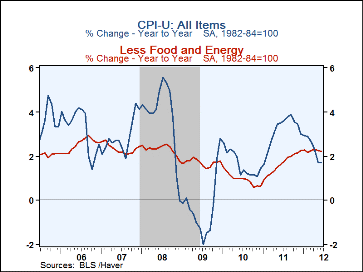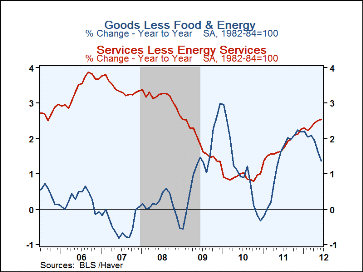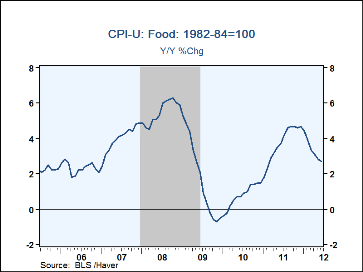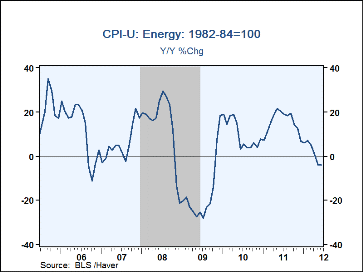 Global| Jul 17 2012
Global| Jul 17 2012U.S. CPI Is Unchanged While Core Increase Is Stable
by:Tom Moeller
|in:Economy in Brief
Summary
Consumer prices were unchanged last month, as expected. The figure left the y/y increase at 1.7%, down from its peak of 3.9% last September. Prices less food and energy increased a steady and expected 0.2% for the fourth straight [...]
Consumer prices were unchanged last month, as expected. The figure left the y/y increase at 1.7%, down from its peak of 3.9% last September. Prices less food and energy increased a steady and expected 0.2% for the fourth straight month. Nevertheless, the y/y gain of 2.2% was near its highest since September 2008.
Energy prices fell 1.4% (-3.9% y/y) as gasoline prices fell another 2.0% (-4.3% y/y). Fuel oil costs fell a not seasonally adjusted 7.9% (-6.8% y/y). Electricity prices dropped 0.5% (+0.5% y/y) but natural gas prices rose 1.7% (-13.6% y/y). Food prices inched up 0.2% (2.7% y/y) as meat costs increased 0.2% (3.3% y/y) and fruits & vegetable prices gained 1.3% (1.1% y/y). Elsewhere, cereals & bakery products costs fell 0.4% (+2.6% y/y) and dairy product prices declined 0.3% (+1.5% y/y), off for the fifth month this year.
For goods alone, prices less food & energy rose 0.2% for the fifth month this year. The 12-month increase fell further to 1.4%, its least since May of last year. Apparel prices rose a firm 0.5%. The 3.9% y/y gain was off its high but remained well above the 0.5% decline in 2010. Furniture & bedding costs slipped 0.1% (+0.6% y/y) while appliance prices increased 0.3% (3.2% y/y) following two months of decline. New motor vehicle prices increased 0.2% but by a greatly-lessened 0.9% y/y.
The 0.2% increase (2.5% y/y) in core service prices reflected a minimal 0.1% rise (2.2% y/y) in shelter costs (32% of the CPI). Owners equivalent rent of primary residences again ticked up 0.1% (2.0% y/y). The y/y increase compares to a low of -0.3% in early 2010. Education costs rose 0.3% (4.2% y/y) while medical care service prices rose a faster 0.7% (4.3% y/y). Public transportation prices declined 1.8% (+1.6% y/y) and recreation services prices increased a firm 0.6% (3.3% y/y).
The consumer price data is available in Haver's USECON database while detailed figures can be found in CPIDATA. The expectations figure is from Action Economics and is found in the AS1REPNA database.
| Consumer Price Index (%) | Jun | May | Apr | Jun Y/Y | 2011 | 2010 | 2009 |
|---|---|---|---|---|---|---|---|
| Total | 0.0 | -0.3 | 0.0 | 1.7 | 3.1 | 1.6 | -0.3 |
| Total less Food & Energy | 0.2 | 0.2 | 0.2 | 2.2 | 1.7 | 1.0 | 1.7 |
| Goods less Food & Energy | 0.2 | 0.2 | 0.2 | 1.4 | 1.3 | 1.1 | 1.3 |
| Services less Energy | 0.2 | 0.2 | 0.3 | 2.5 | 1.8 | 0.9 | 1.9 |
| Food | 0.2 | 0.0 | 0.2 | 2.7 | 3.7 | 0.8 | 1.8 |
| Energy | -1.4 | -4.3 | -1.7 | -3.9 | 15.2 | 9.6 | -18.2 |
Tom Moeller
AuthorMore in Author Profile »Prior to joining Haver Analytics in 2000, Mr. Moeller worked as the Economist at Chancellor Capital Management from 1985 to 1999. There, he developed comprehensive economic forecasts and interpreted economic data for equity and fixed income portfolio managers. Also at Chancellor, Mr. Moeller worked as an equity analyst and was responsible for researching and rating companies in the economically sensitive automobile and housing industries for investment in Chancellor’s equity portfolio. Prior to joining Chancellor, Mr. Moeller was an Economist at Citibank from 1979 to 1984. He also analyzed pricing behavior in the metals industry for the Council on Wage and Price Stability in Washington, D.C. In 1999, Mr. Moeller received the award for most accurate forecast from the Forecasters' Club of New York. From 1990 to 1992 he was President of the New York Association for Business Economists. Mr. Moeller earned an M.B.A. in Finance from Fordham University, where he graduated in 1987. He holds a Bachelor of Arts in Economics from George Washington University.
More Economy in Brief
 Global| Feb 05 2026
Global| Feb 05 2026Charts of the Week: Balanced Policy, Resilient Data and AI Narratives
by:Andrew Cates










